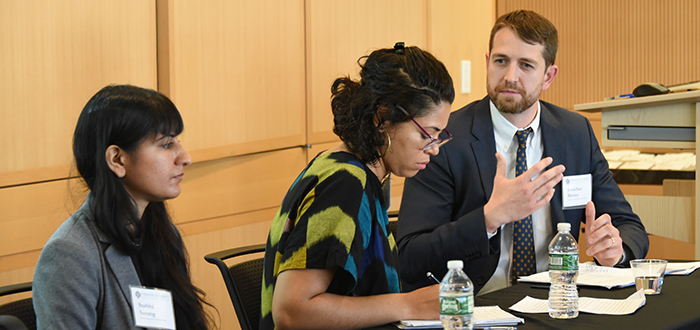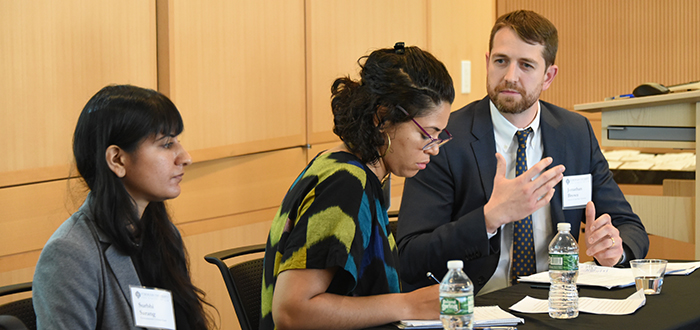On Friday, October 20, 2017 The Fordham Urban Law Journal hosted its 2017 Cooper-Walsh Colloquium titled, “Taking A Bite Out of the Big Apple: A Conversation About Urban Food Policy” at the Fordham Law School Campus in Midtown Manhattan. The daylong event explored various topics related to issues of food access, food governance, food regulation and how they affect urban communities.
The day began with the Director of the CUNY Urban Food Policy Institute, Dr. Nicholas Freudenberg, presenting on his findings from a review of food policy governance in New York City over the last 10 years. Dr. Freudenberg’s conducted a wide ranging exploration of the successes, failures and opportunities associated with the ways food policy is enacted in the city and provided recommendations for improving policy development and tracking in the future.
Next, fellow CUNY professor Natalie Bump Vena, together with Surbhi Sarang, Legal Fellow at the Environmental Defense Fund, gave a presentation on how cooperatives can support food justice aims in New York City. Looking at the how and why of coop development, there presentation supplied a compelling case for using worker/consumer owned food business as a way to address food access issues in low income areas. A response from Professor Jonathan Brown, Director of the Pace Law Food and Beverage Clinic, provided a great opportunity for re-framing some of the points from the presentation and delving deeper into the challenges of launching and maintaining cooperative businesses.

Panelists Surbhi Sarang, Natalie Bump Vena, and Jonathan Brown at the 2017 Cooper-Walsh Colloqiuium. Courtesy Fordham Law School.
Afterword, Professor Nathan Rosenberg presented on his article titled, “Want to Increase Food Access? Ban It from Your Vocabulary” which makes the case for expanding the conversation around access to healthy food beyond solutions focused solely on consumer proximity to food retail. The CUNY Urban Food Policy Institute’s Director of Research, Dr. Nevin Cohen, provided a response which focused on the broader issues that hamper better access to healthier food in the context of historical decisions made by the government and retailers and how those actions are affecting today’s food retail landscape.
During the second half of the day the discussions shifted from issues related to access and governance, toward public health and food safety. The afternoon led off with a presentation from Professor Baylen Linnekin, Adjunct Law Professor at George Mason University Law School and Adjunct Professor at American University, which outlined the legal issues surrounding the practice foraging, which involves searching for and harvesting wild food and other provisions. Professor Linnekin made a compelling case for rethinking some of the more arbitrary and onerous regulations that restrict foraging and instead concentrating on creating a framework that balances the human desire to collect food and the need to maintain responsible stewardship of the environment. Professor Joshua Galperin responded with a reflection on how the legal case for foraging might be framed to provide adequate support and protections for those wanting to engage in the practice.
Lastly, Professor Sarah Roache, Director of the Global Health LL.M. program at the O’Neill Institute for National and Global Health Law at Georgetown University Law Center, spoke at length about the various efforts to discourage soda consumption through legislation, regulation, and litigation in different cities around the United States. Professor Roache outlined some of the emerging strategies used by the beverage industry to combat actions by local governments and some possible ways forward for public health advocates. Dr. Charles Platkin, Director of the New York City Food Policy Center and Distinguished Lecturer at Hunter College, added supporting commentary; providing helpful insight into the nutrition and behavioral dimensions related to the long term effectiveness of municipal efforts to curb soda consumption.
